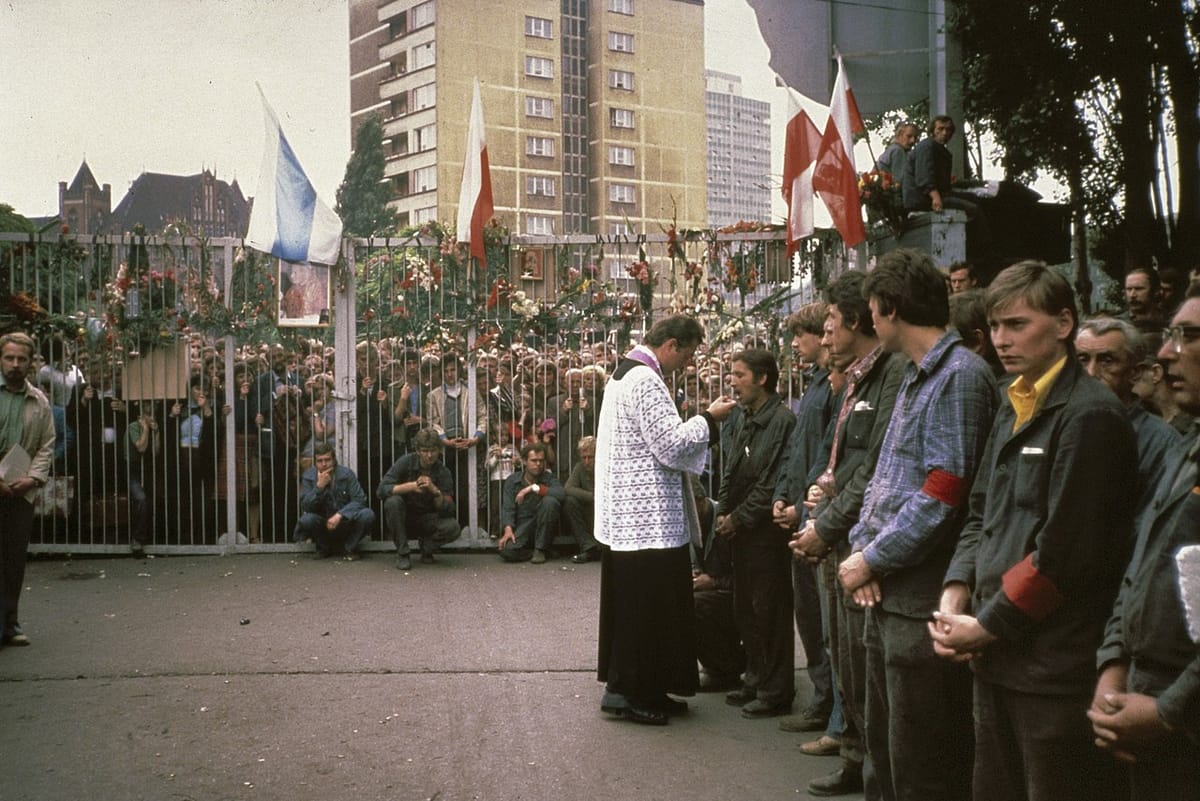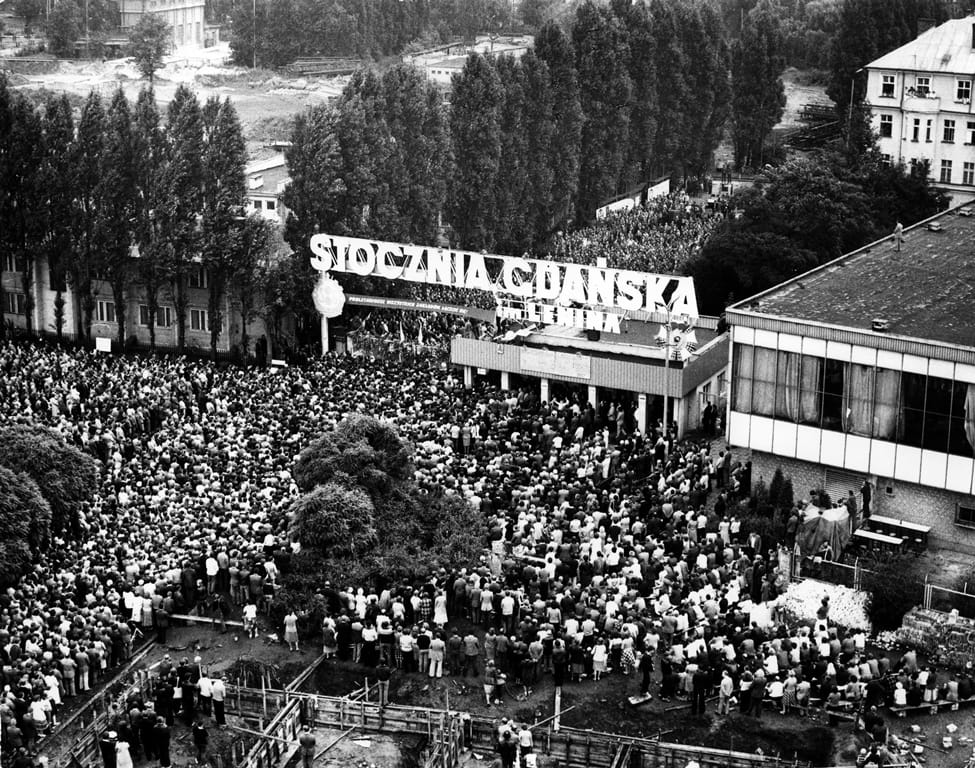Needing Each Other: Kołakowski, Solidarność and a "conservative-liberal-socialist" politics
In 1980 Gdańsk workers demanded not only bread but justice and dignity. Solidarność became a union of contradictions—conservative in memory, liberal in conscience, socialist in solidarity—echoing Kołakowski’s call to hold values in mutual correction.

On the gates of the Lenin Shipyard in Gdańsk, in August 1980, two wooden boards were nailed up, painted hastily with twenty-one demands. The first was revolutionary in its simplicity: “Acceptance of free trade unions independent of the Party.” The second followed: “A guarantee of the right to strike.” As the list continued, it reached beyond bread and wages: “the mass media to be made available to representatives of all faiths”; “the release of political prisoners”; “justice, democracy, truth, legality, human dignity, freedom of convictions.”
These rough boards, still preserved in Gdańsk, were a charter of human dignity. They announced that politics could not be reduced to technocratic efficiency or material satisfactions. They declared that human beings are not only producers and consumers, but citizens and consciences.
This was the birth of Solidarity (“Solidarność”), the first independent trade union in the Soviet bloc, and soon a mass movement of nearly ten million members. It was a shock to the Cold War system. Unlike earlier uprisings in Hungary (1956) or Czechoslovakia (1968), it was not drowned in blood. It endured, becoming the largest civic resistance movement in postwar Europe.
Solidarność was a union, but also a civic uprising that brought together shipyard workers and dissident intellectuals, Catholics and secular liberals, conservatives and socialists. Across divides of faith, ideology, and class, Poles found common ground in a simple conviction: that human dignity could not be surrendered to the Party. Its pluralism was extraordinary. Adam Michnik, a dissident intellectual and later editor of Gazeta Wyborcza, called Solidarity’s approach a “new evolutionism”: not violent revolution, not naïve reform, but the gradual building of independent institutions from below. The philosopher-priest Józef Tischner, meanwhile, described it as an ethics of solidarity: not class hatred, but burden-sharing. “Carry one another’s burdens,” he reminded his listeners, “and so fulfill the law of Christ.”
Across divides of faith, ideology, and class, Poles found common ground in a simple conviction: that human dignity could not be surrendered to the Party. Its [Solidarność] pluralism was extraordinary.
The Catholic Church provided cover and moral authority. John Paul II’s 1979 pilgrimage galvanized millions, urging simply: “Do not be afraid.” The Romantic heritage of poets like Mickiewicz nourished a national conservatism of memory and sacrifice. Underground presses and clandestine universities furnished networks of free exchange. Solidarity was the convergence of all these traditions: Catholic social teaching, Romantic nationalism, civil society, and lived injustice.
To say that Solidarity embodied a philosophy does not mean that shipyard workers were quoting philosophers. Their slogans were practical, moral, immediate. But the movement’s power lay precisely in its refusal to be reduced to a single ideology. It was conservative in conserving faith and memory; liberal in demanding free unions and free speech; socialist in calling for justice in wages and work.
But the movement’s power lay precisely in its refusal to be reduced to a single ideology.
It is here that philosophy helps us read what practice enacted. Few texts capture this paradox more succinctly than Leszek Kołakowski’s brief 1978 essay How to Be a Conservative-Liberal-Socialist. Written in exile in Oxford and published in Encounter, it was a minor work compared to Main Currents of Marxism. Yet in retrospect, it distills a truth that the Gdańsk boards lived: politics cannot be reduced to one value without betraying the human condition.
Yet in retrospect, [Kolakowski] distills a truth that the Gdańsk boards lived: politics cannot be reduced to one value without betraying the human condition.
Kołakowski’s biography itself mirrored Poland’s history. Born in 1927, he grew up under Nazi occupation, his father executed by the Gestapo. After the war he embraced Marxism, convinced it promised “a kingdom of equality and freedom.” A brilliant Party intellectual, he became disillusioned after the Poznań uprising of 1956, when workers demanding “bread and freedom” were gunned down. His 1957 essay Responsibility and History rejected determinism: crimes remain crimes even when performed in the name of Progress. Expelled from the Party and eventually from Poland, he became one of communism’s sharpest critics. Main Currents of Marxism (1976–78) argued that Stalinism was not an aberration but the logical child of Marxism’s utopian eschatology. By promising unity and salvation, Marxism demanded the elimination of dissent, tradition, and liberty.
Main Currents of Marxism (1976–78) argued that Stalinism was not an aberration but the logical child of Marxism’s utopian eschatology. By promising unity and salvation, Marxism demanded the elimination of dissent, tradition, and liberty.
In that context, How to Be a Conservative-Liberal-Socialist reads like a fragment of wisdom carved from bitter experience: not a grand system, but a set of reminders for avoiding catastrophe. Here Kolakowski presents three sets of principles:
A Conservative Believes
That every improvement in human affairs is purchased at a price. “In human life there never have been and never will be improvements that are not paid for with deteriorations and evils.” Institutions like families, nations, and religious communities may look irrational, but they embody fragile wisdom. To abolish them in the name of rational planning is to risk calamity.
A Liberal Believes
That the state’s ancient purpose of providing security remains valid, “but security should never be confused with liberty.” The state’s role is not to make people happy but to limit its own power, leaving space for initiative and invention. Freedom is preserved more by restraint than by action. As Kołakowski put it: “The collective suicide of mankind is conceivable, but a permanent human ant-heap is not, for the simple reason that we are not ants.”
A Socialist Believes
That gross, inherited inequalities of opportunity are morally offensive and socially destructive. “The existence of vast inherited inequalities of opportunity breeds misery and hatred.” A society ruled solely by profit is as threatened with catastrophe as one where profit is abolished. Hence “there are good reasons why freedom of economic activity should be limited for the sake of security, and why money should not automatically produce more money.”
Kołakowski never proposed these as a synthesis. Their value lay in mutual correction: socialism provides moral energy, conservatism humility, liberalism institutional guardrails. Politics, he suggested, must live with contradiction. What we may call — though the phrase is ours, not his — a politics of perpetual self-correction.
Read alongside the 21 Demands Gdańsk, the resonance is striking. Solidarity’s conservatism: shipyard masses, demands for religious broadcasting, national memory. Its liberalism: free unions, free press, release of political prisoners. Its socialism: wage increases, pensions, housing, social services. The workers were not Kołakowski’s disciples. Yet their boards enacted his logic: tradition, liberty, and justice together, not collapsed into one ideology. Hence Solidarity was a “self-limiting revolution” — it demanded dignity, not utopia.
Solidarity was a “self-limiting revolution” — it demanded dignity, not utopia.
Kołakowski’s writings circulated widely in the Polish underground press. Essays like “Theses on Hope and Hopelessness” and selections from Main Currents of Marxism were smuggled back into Poland and read by dissidents seeking a moral vocabulary beyond Marxist orthodoxy. Among the leaders of KOR — Adam Michnik, Jacek Kuroń, Bronisław Geremek — Kołakowski was treated as a kind of absent patron, the “heretic of heretics” who had passed from Marxist faith to pluralist resistance. His insistence that crimes could never be excused in the name of history helped form the opposition’s language of conscience. Józef Tischner, Solidarity’s unofficial chaplain, echoed these themes in theological key, arguing that no system could abolish personal responsibility for the other. Even Karol Wojtyła, as Archbishop of Kraków and later as John Paul II, moved in circles where Kołakowski’s writings were discussed. While there is no direct evidence that he read particular essays, Kołakowski’s emphasis on dignity, memory, and conscience resonated strongly with Wojtyła’s own teaching. If the shipyard workers of Gdańsk lived the creed without ever reading him, the intellectuals and priests who gave the movement its voice often did so with his words, or at least his example, in mind.
After 1989, the coalition splintered. Shock therapy elevated liberal markets at the cost of socialist solidarity. De-communization split conservatives demanding justice from liberals urging reconciliation. Wałęsa’s populism clashed with intellectuals. The wojna na górze — “war at the top” — revealed the disintegration. Some concluded that Solidarity was an opposition movement unsuited to governance. Yet its legacy does not lie in a model of policy. Its lesson is that pluralism can resist tyranny — that memory, freedom, and justice must be held together if politics is to be human.
Yet [Solidarność] its legacy does not lie in a model of policy. Its lesson is that pluralism can resist tyranny — that memory, freedom, and justice must be held together if politics is to be human.
To set Kołakowski’s essay beside the movement of Solidarność is not to claim influence. The shipyard workers did not read Encounter. But philosophy and history can illuminate one another. The Gdańsk boards show how, in practice, human beings held together irreconcilable values; Kołakowski’s work explains why this discipline of contradiction is a necessity. Read together, they remind us that freedom endures only when values limit and correct one another.
Kołakowski once remarked that no “Conservative-Liberal-Socialist International” would ever exist, because it could not promise happiness. The irony was deliberate: a politics that rejects utopia can never promise paradise. It offers only the burden of contradictions. Yet the boards of Gdańsk show that this burden can itself be ennobling. They testify that bread without justice is tyranny, liberty without solidarity is emptiness, and tradition without critique is dogma.
The irony was deliberate: a politics that rejects utopia can never promise paradise. It offers only the burden of contradictions.
To be a Conservative-Liberal-Socialist, then, is not to abolish contradictions but to carry them. It is to recognize the beauty of interdependence: the conservative warning against hubris, the liberal defending conscience, the socialist demanding justice. That, in an age of fracture, is the common lesson of a brief essay written in Oxford and two wooden boards painted in Gdańsk — a politics of perpetual self-correction.
To be a Conservative-Liberal-Socialist, then, is not to abolish contradictions but to carry them. It is to recognize the beauty of interdependence [...]






